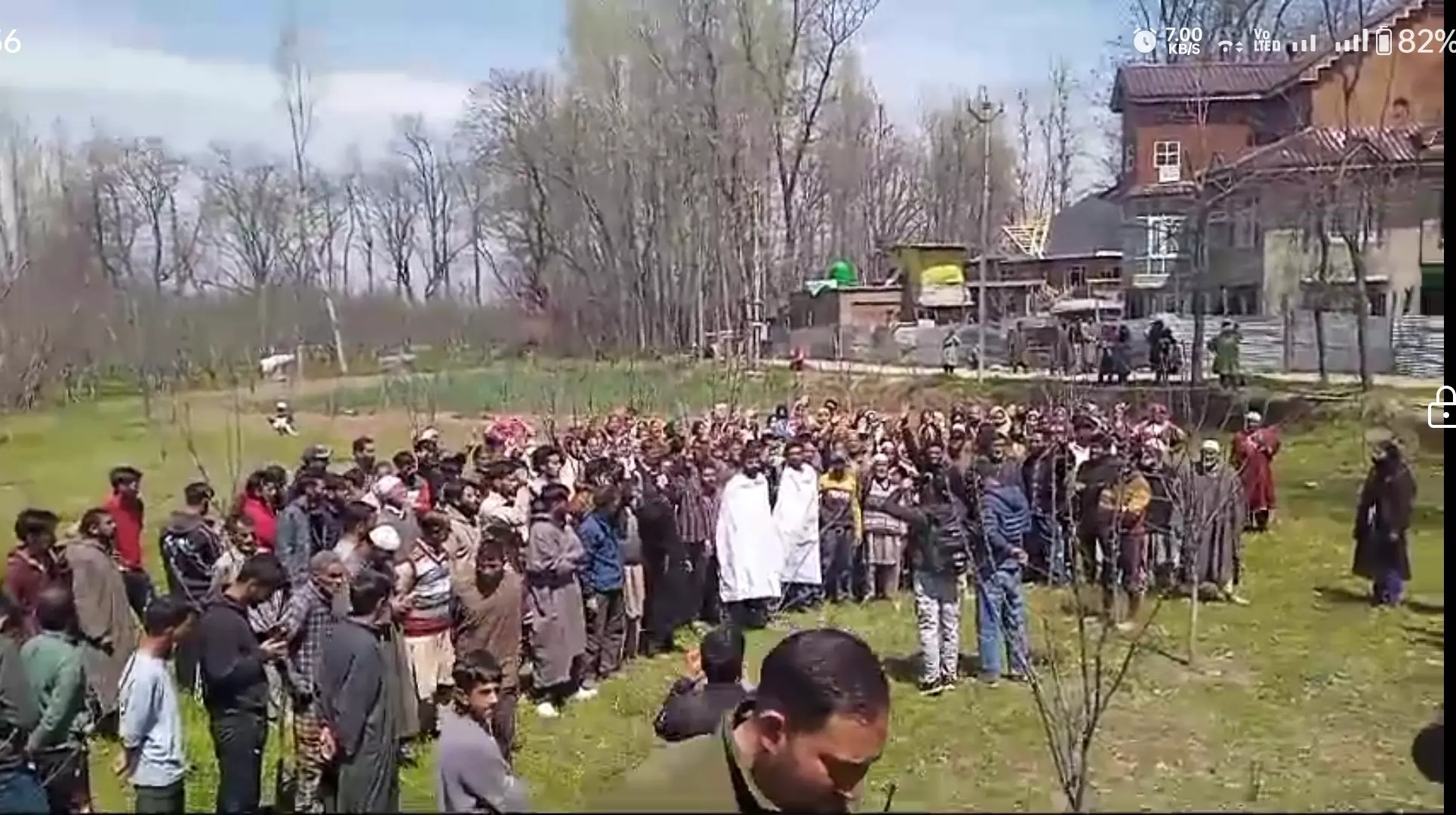Kashmir Orchardists Up in Arms Against ‘Forcible’ Takeover of Their Lands

They don’t allow us to chop down a single tree. We can’t build a small dwelling, not even a chalet on our farming land. But then they come and uproot thousands of fruits and other trees in the name of upgrading infrastructure,” whined Abdul Gani Reshi.
Reshi is among the fruit-growers and other farmers of Reshipora, a picturesque village of Kashmir Valley’s southern Shopian district surrounded by dense deodar forests, apple orchards, and terraced mustard and rice fields, offering breathtaking views of the valley and nearby mountains. For the past one month they have been protesting over “forcible” takeover of their farming land, mainly apple orchards, for a new railway project.
Earlier this week, the agitating farmers, some of them draped in white shrouds symbolising they were ready to give their lives to save their orchards, marched through the village streets chanting "We want justice". Before dispersing, they pledged before a group of visiting reporters to “intensify our fight”.
Next day Shopian’s Deputy Commissioner Faz Lul Haseeb rushed here and after moving through the apple orchards and other farming land being acquired by the Indian Railways for laying a 27.6km line from Awantipora in neighbouring Pulwama district to the Shopian town told the agitating farmers, “I have been in touch with the Railways authorities. We are looking into the issue, and I assure you all the stakeholders will be taken on board.”
But most people here are overly pessimistic. “I do not think they are going to shelve the project or even change the alignment of the proposed track, " said Aejaz Wani, the Lambardar of Reshipora whose own apple orchard is also being acquired for the project.
“Ours is a backward village whose nearly 3,000 population earns livelihood from these orchards. The markings for the envisioned railway line show it will be about 300-feet-wide- track and, at least, two residential houses and almost all the farming land here come under it. This is going to ruin our lives,” Wani lamented.
The village elders pleaded before the DC that the new railway line should be aligned carefully after proper consideration. “It should not snatch our livelihood, nor should it be ruinous to the ecology,” they told him.
The Centre is spending billions of rupees to overcome its infrastructural challenges in Jammu and Kashmir. The projects include new roads, bridges and railway lines aimed at improving connectivity. The officials say that the new hinterland connectivity railway projects spanning 189 km will enhance multimodal connectivity, increase capacity for freight and passenger trains, and provide faster rail connectivity.
The Indian Railways recently sanctioned five railway lines in the Union Territory which include the doubling of the Baramulla-Banihal section (135.5km), Baramulla-Uri (50km), Sopore-Kupwara (33.7km), Awantipora-Shopian (27.6km), and Anantnag-Bijbehara-Pahalgam (77.5 km).
Prime Minister, Narendra Modi, during his recent visits to Jammu and Srinagar launched multiple projects, including for education, railway, aviation and road sectors, worth ₹36,900 crore virtually from the twin capitals. The officials had termed it as a harbinger of a new era of development and growth in J&K and some other parts of the country where these projects took off.
The J&K government has assured the people that the connecting Kashmir with the rest of the country through rail and the expansion of the rail network within the Valley will help in fostering local businesses, improving transportation, boosting tourism, and facilitating the movement of goods and services, ultimately contributing to the socio-economic advancement of the scenic region.
However, the opposition parties have said that some of the proposed projects will necessitate the cutting of thousands of apple trees and these orchards being the only source of income for the locals it would rob them off their productive lands thereby leaving them financially crippled. The National Conference (NC) has cautioned the government that Awantipora-Shopian rail track will inevitably impact the local ecology too. “They must relocate the project by utilizing state owned land instead,” said Imran Nabi Dar, the NC spokesman.
Ecologists too have voiced their concern, asserting that building railway lines and major roads through the Kashmir Valley without taking into consideration its ecological impact is fraught with serious consequences. Former chief minister and People’s Democratic Party (PDP) president Mehbooba Mufti while endorsing their view requested J&K Lieutenant Governor, Manoj Sinha, to involve a panel of environmental experts before taking such major decisions. She asserted that J&K is a very fragile region and any intervention into wooden or agricultural lands should be taken up after proper expertise. “Fruit industry is the backbone of our economy. Railway projects are good things, but it should not be at the cost of cutting down apple trees and ruining locals' livelihood. There should have been a proper mechanism. Uttarakhand is a live example before us. We shouldn't push J&K to become another Uttarakhand”.
However, some horticulture specialists and marketing experts say that new roads, railway lines and raising other infrastructure may shrink the land in the Valley, but improving connectivity is also vital for its horticulture produce which generates ₹ 16,000 crores annually, contributing eight per cent to J&K’s Gross State Domestic Product (GSDP).
“If the rail reaches Shopian and other far-off places in the Valley you would be able to transport the horticulture produce to the markets across the country on time in order to maintain the highest level of quality. This also means you will get a greater value and better prices for your apples and other fresh fruits,” said Dr. AH Pandit, a horticulture specialist. He pointed out that presently Srinagar-Jammu highway serves as the only road link between the Kashmir Valley and the rest of the country, but it often remains shut during the harvesting season, causing huge losses to the growers. “Kuch pane ke liye kuch khona padta hai (To gain something, one has to lose something else),” he added.

